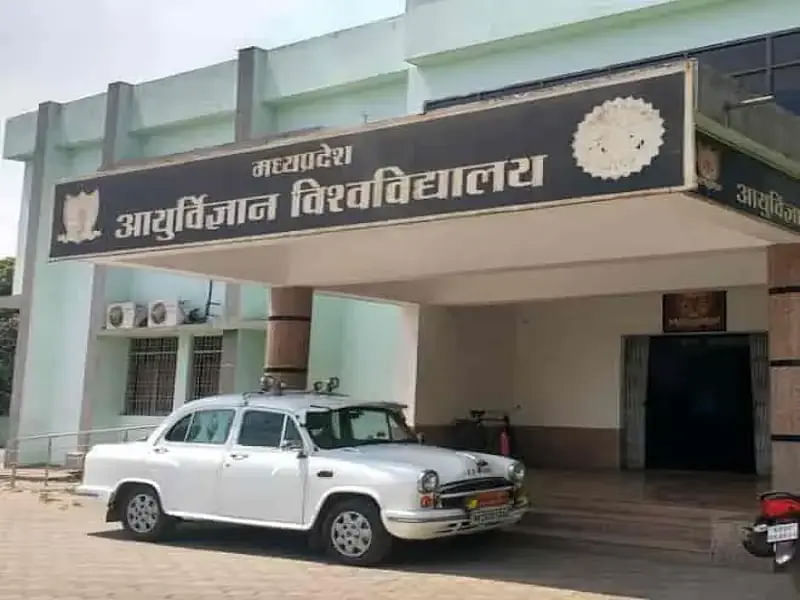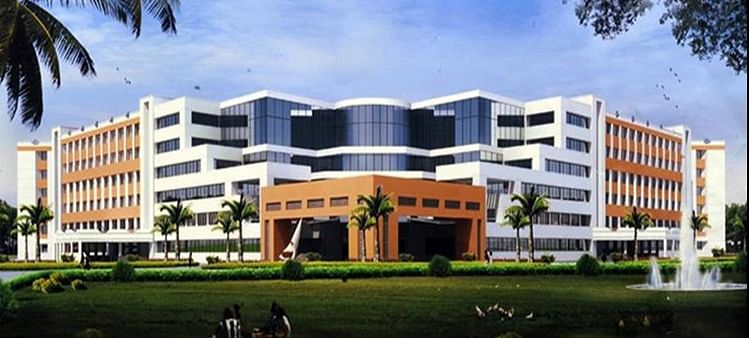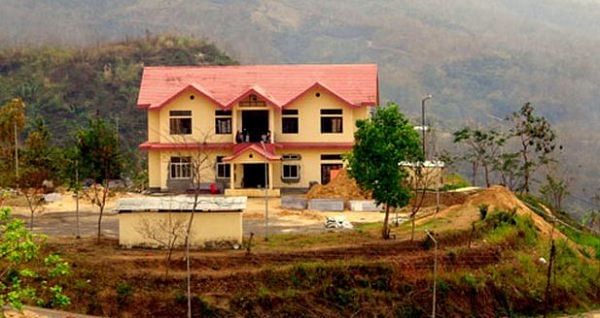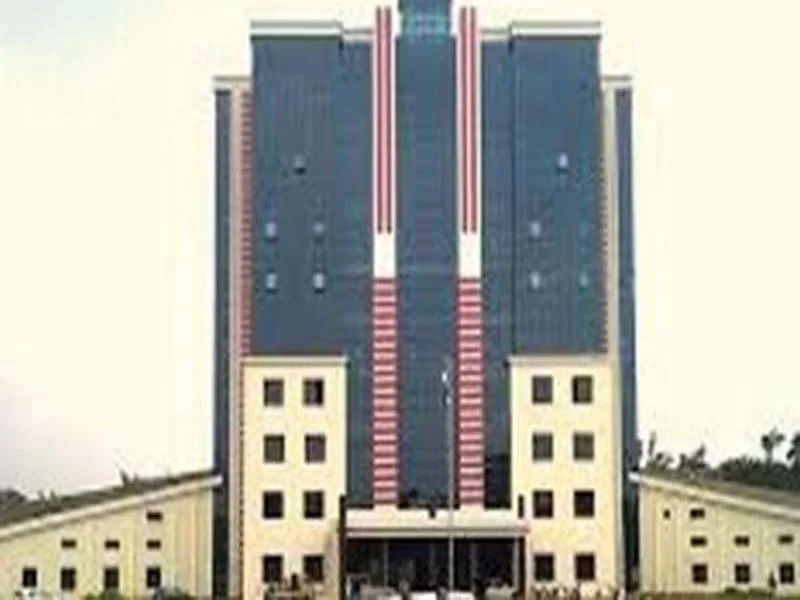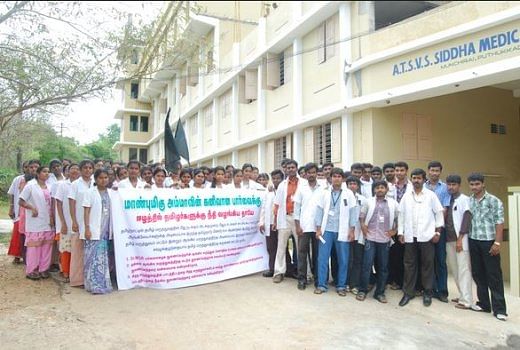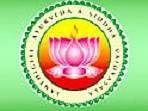BSMS (Bachelor of Siddha Medicine and Surgery)

BSMS is a four and half-year long undergraduate degree that deals with the ancient practice of Siddha medicine for providing an alternative to the allopathic medicinal approach. The course focuses on studying the various tenets of the ancient practice and how their medicinal practices can be used to heal people’s medical problems. Job opportunities after the BSMS degree include Clinical Researcher, Dermatologist, Medical Consultant, Siddha Pathologist, Paediatrician, Physiologist, Pharmacologist, etc.
Table of Contents
- About BSMS
- Eligibility Criteria for BSMS
- How to Get Admissions in BSMS?
- Popular Entrance Exams for BSMS
- Top 10 BSMS Colleges in India
- Fee Structure for BSMS
- Syllabus and Subjects for BSMS
- Why Choose BSMS?
- Preparation Tips for BSMS
- Scope for Higher Education
- Salary of a BSMS Graduate
- Career Options After BSMS
- Skills That Make You the Best BSMS Graduate
BSMS Course Details
| Degree | Bachelors |
| Full Form | Bachelor of Siddha Medicine and Surgery |
| Duration | 4 Years |
| Age | Minimum 17 years |
| Subjects Required | Physics, Chemistry, Biology |
| Minimum Percentage | More than 55% in 10+2 Board Examination |
| Average Fees | ₹50K - 3 LPA |
| Similar Options of Study | Bachelor of Medicine and Bachelor of Surgery (MBBS), Bachelor of Dental Surgery (BDS), Bachelor of Ayurvedic Medicine and Surgery (BAMS), Bachelor of Unani Medicine and Surgery (BUMS) |
| Average Salary | INR 3-5 LPA (Source: Payscale) |
| Employment Roles | Physician / Doctor |
| Top Recruiters | Government Siddha Hospitals, Private Hospitals, Own Clinic |
BSMS Latest Updates
- April 05, 2023: The Application Form for NEET 2023 has been released and the last date to apply is April 06. Read more
About BSMS
Medicinal approaches in recent years have become diversified. With the establishment of the Ministry of AYUSH in 2014 by the government of India, various career alternatives to allopathic medicines have popped up. Ayurveda and Siddha medicine are major areas of employment for aspirants who seek a career in alternative medical sciences. The full form of BSMS translates to Bachelor of Siddha Medicine and Surgery. Britannica defines Siddha medicine as a ‘System based on a combination of ancient medical practices and spiritual discipline’.
Eligibility Criteria for BSMS
For BSMS admissions, aspirants of the course must meet the basic eligibility demands. The basic BSMS eligibility is passing the 10+2 from a recognized with a minimum 50% marks. Students must have passed the HSC exams in the first attempt itself. The BSMS eligibility also includes passing the entrance exam as indicated by the Ministry of AYUSH. The minimum age limit for a Bachelor of Siddha Medicine and Surgery is 17 years.
How to Get Admissions in BSMS?
BSMS course admissions are offered to aspiring candidates who satisfy the basic eligibility criteria. The basic BSMS eligibility is completing the 10+2 in the first attempt itself from a recognized board. In addition to merit eligibility, students must also have passed the entrance exam process. Applications for the BSMS course admission process may be availed by going to the college portal or directly visiting the admissions office of the concerned institution. Mentioned below are the details of the admission process in general:
How to Apply?
BSMS course details are available on the college websites through which the applicants can begin their registration process. The application process can be carried out through both the offline or the online mode. For the online process, candidates are required to visit the college portal, create an ID, fill in the details and make the payment online.
Selection Process
Admissions for the BSMS course are strictly offered to candidates who satisfy the criteria of clearing the entrance exam process. The admit card and other relevant details are updated on the college website beforehand. Students can view their results by logging in to the college website or receive them directly via email.
Popular Entrance Exams for BSMS
Entrance exams for the BSMS course duration are conducted to ensure the colleges select the best candidates. There are a variety of criteria that a BSMS college seeks in a candidate such as knowledge of the subject matter, general knowledge of the medical field, and required skill set. Candidates are required to adequately prepare for the exams to ensure a strong performance for selection into the course. Mentioned below are some of the popular entrances for BSMS and other fields of Ayurveda:
A Quick Glance at the BSMS Entrance Exams
BSMS entrance exams are conducted to ensure colleges are able to select the best suitable candidates. The entrance exams are choreographed in a manner to test the skill set and aptitude of the aspiring candidates along with the core knowledge. Mentioned below is the general pattern for a BSMS entrance exam:
- The paper has a total of 180 questions
- The total duration of the exam is 180 mins
- MCQ type questions are asked
- 4 marks were awarded for each correct attempt
- Negative marking is -1 for every wrong attempt
- Compulsory subject areas are Physics, Chemistry, and Biology
Top 10 BSMS Colleges in India
The best BSMS college in India provides the best institutional and infrastructural facilities for the students. A top BSMS college ensures they train the students in accordance with all the demands of the professional industry. Mentioned below are the top BSMS colleges in the country:
|
Sl. No. |
Name of the Institute |
|
1. |
|
|
2. |
|
|
3. |
|
|
4. |
|
|
5. |
|
|
6. |
|
|
7. |
|
|
8 |
|
|
9 |
Sharda University |
|
10 |
Amity University, Noida |
Fee Structure for BSMS
The average BSMS course fees for various institutions range from INR 50,000-2 LPA. Mentioned below is a list of fees charged by various BSMS colleges:
|
Sl. No. |
Name of the Institute |
Fee Structure |
|
1. |
RVS Medical College and Hospital, Coimbatore |
INR 30,000 PA |
Syllabus and Subjects for BSMS
BSMS syllabus is curated to inculcate the various concepts of Siddha Medicine and relevant areas. BSMS meaning translates to Bachelor of Siddha Medicine and Surgery. The subjects of the BSMS course structure adopt a theoretical as well as pragmatic approach to the subject matter. Upon completing the BSMS course duration, students can find jobs in various roles such as Physiologist, Chiropractor, Dermatologist, Paediatrician, Siddha Pathologist etc. Lied below are some of the core subjects in the BSMS syllabus:
- Microbiology
- Physiology
- Pharmacology
- Anatomy
- Pharmaceuticals
- Pathology
- Forensics
- Toxicology
Read More About BSMS Syllabus and Subjects
Why Choose BSMS?
One of the common questions that aspirants often ask is, ‘What is BSMS course’? Being a relatively newer course, many students are still not fully equipped with the tenets and scope of the BSMS medical degree. The field provides a lot of scope in alternative medicinal areas other than allopathic approaches. To understand ‘What is BSMS?’ and ‘Why choose BSMS?’ better, we need to ask the following questions:
What is BSMS All About?
BSMS degree means Bachelor of Siddha Medicine and Surgery. It is a four and half year-long undergraduate degree focusing on Siddha medicinal practices and related areas. The course duration specializes students in the field of microbiology, physiology, community medicine, dentistry, dermatology, gynecology, pediatrics, etc. BSMS course in India provides an in-depth analysis of the subject along with enhancing the skill set for the professional industry. Job roles after the BSMS course include Paediatrician, Dermatologist, Doctor, Physiologist, Chiropractor, Obstetrician, etc.
What does a BSMS Graduate do?
BSMS degree full form stands for Bachelor of Siddha Medicine and Surgery. BSMS graduates find job roles in a variety of sectors related to Siddha medicine, Ayurveda, and herbal medicine. Students can also opt for higher studies if they do not immediately want to enter the job industry.
Physiologist: The role of a physiologist includes looking into the various physical problems or shortcomings that an individual might be experiencing. They provide solutions in terms of fitness routine, diet, a plan of action based on the client’s needs, etc.
Reasons Why BSMS Can Fetch You a Rewarding Career?
The field of Siddha medicine is relatively a newer concept to many candidates in the field of education and research. Getting a nod only in the year 2014 after the creation of the Ministry of AYUSH, the scope for the field has increased at a very rapid pace.
Future Scope of the Field: Siddha medicine, Ayurveda, herbal medicine are many untapped fields that have gained a lot of prominence in the last few years. Different approaches in the governance and the development of the Ministry of AYUSH, the scope for a career after the BSMS degree only goes upward from here.
Read More About BSMS - Jobs and Opportunities
Preparation Tips for BSMS
For preparing for the BSMS course, students must have in-depth knowledge or a core understanding of the concepts of Siddha medicine and related fields such as Ayurveda. The course is very tedious in nature, demanding a lot of academic reading and research from the students. Some of the important tips to excel in the BSMS course duration are:
Time Management: A tedious course requires proper time management from the students so as to complete all the important concepts on time.
Understanding of Indian medicinal practice: Indian medicinal practices and approaches are very different from the allopathic view. Students need to grasp a clear understanding of the traditional practices in science and medicine around the country.
Study About the Course: It is one of those courses that is still relatively new to the mind and ethos of the Indian population. Aspirants of the course should study the course tenets in detail to carve a better understanding.
Scope for Higher Education
Job opportunities are plenty after the completion of the BSMS degree duration. Students who do not wish to apply for the jobs immediately after graduation can opt for higher studies. Higher studies after BSMS means a higher skill set and more polished knowledge.
Higher education also ensures a higher starting salary upon joining the industry. Listed below are some of the educational options after the BSMS course:
Salary of a BSMS Graduate
The average salary after BSMS course duration ranges from INR 3-5 LPA (Source: Payscale).
Read More About BSMS Salary
Career Options After BSMS
The sector of Siddha medicine and Ayurveda is a fast-evolving sector in recent years. With a rising trend in importance given to the ayurvedic and traditional approaches to medicinal purposes, the scope of courses such as BSMS has improved drastically.
The establishment of the Ministry of AYUSH in 2014 has opened up ample career opportunities for students of the course. Mentioned below are some of the career options available to students after the BSMS course:
- Pathologist
- Chiropractor
- Physiologist
- Medicinal Botanist
- Medical Consultant
- Dermatologist
Skills That Make You the Best BSMS Graduate
BSMS course duration is of four and half years that demands tedious academic reading for understanding the course tenets. However, the course itself is a very pragmatic one that demands a set of soft skills from the candidates for excelling in the work industry. Some of these skills may be inherent while others may be developed in due course of time. Mentioned below are a few skills that help the candidate in excelling at the BSMS degree:
- Communication Skills
- Analytical Skills
- Empathy
- Interpersonal Skills
- Reasoning Skills
- Research Skills
- Enterprising Abilities
